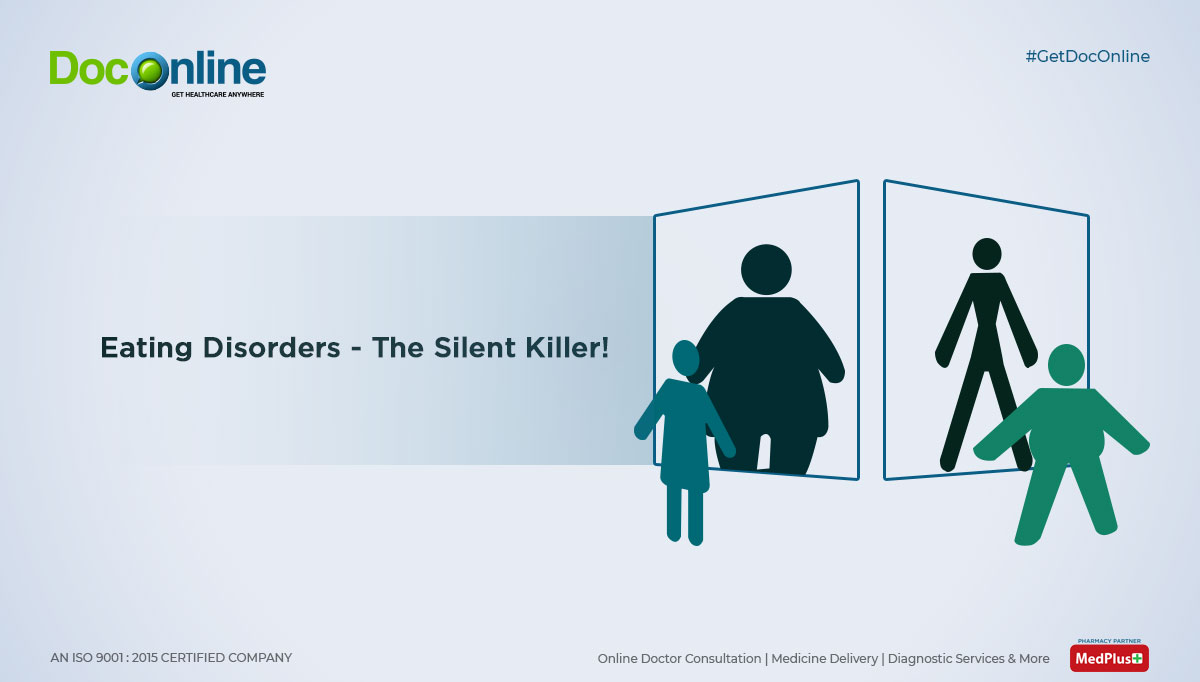As the term ‘disorder’ suggests, an Eating Disorder is a deviation from the normal eating habits. It encompasses a range of psychological disorders characterized by disturbed or abnormal eating habits.
When eating habits tend to cause psychological disorders, the abnormality is known as eating disorders. People with this disorder are excessively overconcerned about their calorie intake or weight gain. They have a sense of guilt for increase in body weight and are obsessed with their body image. They have this false notion that eating less would make them look good and feel better, which is not the case.
Restrictive eating and over-exercising lead to patterns of disrupted food habits and weight obsession.
Types of Eating Disorders
Anorexia nervosa: These people always see themselves as overweight. They keep weighing themselves repeatedly. Their obsession with weight-gain has a direct impact on restricting their food intake, resulting in constant weight loss. Lack of nutrition, consequently affects the health and appearance also. In extreme cases, the behavior has resulted in lot of complications. For instance, many a young man and woman have succumbed to death due to starvation. Altered states of perception of one’s self-image coupled with low self-esteem puts them in the denial of the fact that they are underweight.
Other symptoms may develop like:
- Osteoporosis (Thinning of Bones)
- Mild Anemia
- Muscle wasting and Weakness
- Brittle hair and nails
- Low blood pressure
- Slow breathing and pulse rate
- Drop in body temperature, causing the person to feel cold always
- Lethargy and sluggishness
- Infertility
Bulimia nervosa: These people tend to overeat in unusually excess amounts. This binge-eating is followed by forced vomiting, excessive use of laxatives or diuretics, fasting, excessive exercise, or a combination of these behaviors. Unlike anorexia nervosa, people with bulimia nervosa usually maintain what is considered a healthy or relatively normal weight.
Other symptoms may develop like:
- Chronically inflamed and sore throat
- Worn tooth enamel
- Increasingly sensitive and decaying teeth due to exposure to stomach acid
- Gastrointestinal problems and acid reflux disorder
- Intestinal distress and irritation from laxative abuse
- Electrolyte imbalance (too low or too high levels of sodium, calcium, potassium and other minerals) which can lead to stroke or heart attack
- Severe dehydration from removal of fluids
Binge-eating disorder: People with binge-eating disorder lose control over their eating. Unlike bulimia nervosa, periods of binge-eating are not followed by purging, excessive exercise, or fasting. As a result, people with binge-eating disorder often are overweight or obese.
Other symptoms may develop like:
- Eating unusually large amounts of food within a specific amount of time
- Eating even when one is full or not hungry
- Eating fast during binge episodes
Risk Factors
The following factors can increase the risk of developing a negative body image leading to eating disorders:
- Age: This is seen in late childhood and adolescence. However, body dissatisfaction can affect people of all ages and is as prevalent in midlife as in young adulthood, especially in women.
- Gender: Though adolescent girls are more prone to body dissatisfaction, the rate of males is also catching up.
- Depression / Low Self- Esteem: It has a direct impact on the eating habits. One can refrain from eating totally or overindulge in it.
- Personality Traits: People with perfectionist tendencies, high achievers, black and white thinkers and those who compare themselves to others are prone to eating disorders.
- Teasing: People who are teased about their weight run the risk of developing body dissatisfaction.
Treatments and Therapies
- Adequate nutrition, reducing excessive exercise, and stopping purging behaviors are the foundations of treatment.!
- Developing a positive body image. How? By accepting oneself, appreciating and respecting one’s body. A positive body image is a protective factor that makes one more resilient to eating disorders.
- Cognitive Behavioral Therapy (an approach where irrational thoughts are recognized, analyzed and restructured to more rational self-talk) is frequently used.
- A balanced lifestyle with healthier attitudes and practices relating to food and exercise.
- Parents can greatly influence their child’s developing body image and self-esteem. Focusing on children’s unique talents and inner attributes, coupled with unconditional love, offers a strong foundation for a lifelong positive body image.
Looking for Doctor's Advice?













